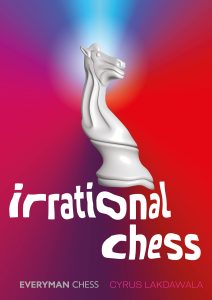Here is the publishers blurb from the rear cover:
“The vast majority of chess games witness familiar strategies and well known tactical motifs. These are the games that you will find in the anthologies and opening repertoires. Sometimes however, games appear that seem to have been played on a different planet.
Conventional strategies go out of the window. Familiar tactical themes are nowhere to be seen. Chaos has broken out. The pieces appear to be in open rebellion and are steadfastly refusing to do the natural jobs that they were designed for.
Having to navigate a path in such a game can be a nightmare. Do you rely purely on calculation? Is it better to trust your instincts? Can you assess the position using “normal” criteria?
In order to answer these questions, prolific chess author and coach Cyrus Lakdawala has assembled a collection of brilliantly unconventional and irrational games. The positions in these games appear almost random. Kings have gone walkabout, pieces are on bizarre squares, huge pawn rollers are sweeping all before them.
Irrational chess is like nothing you’ve seen before. As well as being highly instructive this is a hugely entertaining book.
Do not adjust your set. It’s chess, Jim, but not as we know it.”
and about the author:
Cyrus Lakdawala is an International Master, a former National Open and American Open Champion, and a six-time State Champion. He has been teaching chess for over 30 years, and coaches some of the top junior players in the U.S.
As with every recent Everyman Chess publication high quality paper is used and the printing is clear. Each diagram is clear as is the instructional text. Figurine algebraic notation is used throughout and the diagrams are placed adjacent to the relevant text.
Here we have another title from the ever prolific keyboard of Cyrus Lakdawala. Irrational Chess seems like a good match for this author’s sometimes irrational writing style.
But my first question is: what makes a game irrational? If you watch two beginners playing, their moves will mostly be irrational because they have little or no idea what they’re doing. We’re really talking about games between strong players where no one really knows what’s going on. Games where pieces end up on unlikely squares, where there are unusual material imbalances, where one player has decided to take a risk, or to confuse his or her opponent.
As Mikhail Tal, the Patron Saint of Irrational Chess said, “You must take your opponent into a deep, dark forest where 2+2=5 and the path leading out is only wide enough for one.”
That, for the most part, is what you’ll find here. We all enjoy playing through and studying games of this nature. Some of us enjoy playing games like this ourselves as well.
In his rather rambling introduction, Lakdawala tells us how to identify positions of disorder/irrationality.
He offers 12 pointers, for example:
1. A lack of continuity, in that one thing doesn’t necessarily logically lead to what we expected. In this book we try to decode the “without words” positions, which cannot be accessed logically/verbally broken town and explained easily. In such positions the logical mind tends to transform atavistically into a kind of animal consciousness, where nothing is fixed and we are engulfed in a deep realization of terrifying impermanence, where all which matters is our survival.
2. You are lost in the woods and hungry. Then you come upon a patch of unfamiliar berries and mushrooms which could be edible or could be poisonous. The question is: are you going to risk eating them? This book examines the mechanics of risk. Go too far and you overextend; play too safely with too strong a self-preservatory instinct and you may suppress opportunity.
and…
10. While the Sesame Street Muppets taught us that learning can be fun, in this book we look at games so irrationally complex that it is actually difficult to learn from many of them. Nonetheless, in a position’s confusion, just because we lose our faculty of sight, doesn’t also mean we also lose our power of reason. The idea behind this book is: any position, no matter how complex, can still be broken down (at least to some degree!) into points of data, from which we hope to come up with the correct idea. So before most of the examples, I try my best to “explain” that which is often unexplainable. In such positions when we think: “I have a strong intuition on the matter”, it won’t be code for “I’m taking a wild guess!”
If you’re at all familiar with this author’s work you won’t be surprised by all this chattering about Muppets and mushrooms. Cyrus has a devoted fanbase who will lap this up, but it’s not to everyone’s taste.
Reading on, what we have here is eight chapters: four relatively long chapters, covering Attack, Defence and Counterattack, The Dynamic Element (I’m not sure how exactly this differs from Attack, but never mind) and Exploiting Imbalances, followed by four shorter chapters, on Irrational Endings, Opening Shockers, Crazy Draws and Promotion Races. We have 89 games or extracts, copiously illustrated with many diagrams.
Cyrus, quite rightly, is a devotee of active learning, sprinkling his annotations, as he always does, with exercises (Planning, Combination Alert or Critical Decision). You might like to cover up the page and try to solve them before reading on. The author is a highly experienced annotator who knows his market well. He’s always thorough, but without going over the top with long computer generated variations, and makes ample use of the latest engines to ensure accuracy. Once you get past the verbiage, he does an excellent job of explaining complex ideas and tactics in a way that is understandable to his readership.
You’ll find most of the greats featured within the 400 pages, from Morphy and earlier through to Carlsen and AlphaZero. You might consider the likes of Capablanca, Euwe and Smyslov to be supremely rational players, but they’re there as well. Tal, unsurprisingly, features on several occasions, but there’s no sign of Alekhine.
If you’re knowledgeable about chess history and literature you’ll encounter a lot of old friends, but they will always be new to some readers. There were quite a few games that were new to me – and I much enjoyed discovering them for the first time.
I wouldn’t dispute the irrationality of most of them, but there were one or two, especially in the first chapter, which you might consider were just very well played attacking games. How would you judge this much anthologised game? (Click on any move for a pop-up window.)
On the other hand, there’s no argument about the irrationality of games like this, described by Lakdawala as one of the most crazy, head-spinning games in the book.
My heart is thudding, as if watching a Quentin Tarantino movie while on the treadmill is how Lakdawala introduces the following encounter.
A small historical point – the game Van der Loo – Hesseling (Game 75 here) is known to be a fake, with White’s name usually given as Van de Loo, but the author is apparently unaware of this.
Irrational Chess is produced to this publisher’s customary high standards: well laid out with many large diagrams. This book will appeal to players of all standards, and will undoubtedly bring a lot of pleasure to a lot of readers, demonstrating, to anyone who might doubt it, the excitement and richness of chess. Lakdawala’s obvious enthusiasm and love of chess shine through everything he writes, but his eccentricities will always divide the critics.
If you’re easily offended you should perhaps steer clear. If you’re on the religious right you’ll find some of the words blasphemous, while elements of the woke left will consider other words to be mental health slurs.
Then you read something like this:
Black’s position pulls him down, like our demanding, emotional, high-maintenance college ex-girlfriend.
Or this:
If Fischer’s pawns are an athlete’s body, then his rook represents the love handles.
Sexist? Inappropriate? It’s your decision. A sensitivity reader would have a field day with his/her red pen. You might think, and I might well agree with you, that a lot of people these days are over-sensitive, but we are where we are. The author’s many devoted admirers don’t seem to have a problem.
If you’re a Lakdawala fan, and there are many around, or if his writing style appeals to you, you’ll really enjoy this book, and the often extraordinary and thrilling games featured within. The games are certainly a lot of fun, especially if you haven’t seen them before. If you find Cyrus’s writing fun as well, there’s no reason to hesitate.
Richard James, Twickenham 28th August 2023

Book Details :
- Paperback: 400 pages
- Publisher: Everyman Chess (20 Feb. 2023)
- Language: English
- ISBN-10: 1781946485
- ISBN-13: 978-1781946480
- Product Dimensions: 17.4 x 2.29 x 23.52 cm
Official web site of Everyman Chess


